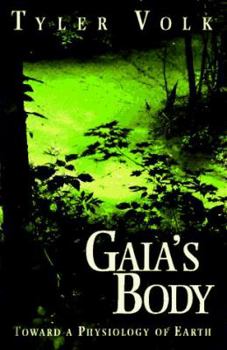Gaia S Body: Toward a Physiology of Earth
Select Format
Select Condition 
Book Overview
If there's such a thing as Gaia--if Earth's biosphere really is a self -sustaining meta-organism--then it must have something like a physiology. What does this consist of? What are the systems,... This description may be from another edition of this product.
Format:Hardcover
Language:English
ISBN:0387982701
ISBN13:9780387982700
Release Date:October 1997
Publisher:Copernicus Books
Length:269 Pages
Weight:0.35 lbs.
Dimensions:1.0" x 6.4" x 9.4"
Customer Reviews
5 ratings
Science for Humanity!
Published by Thriftbooks.com User , 23 years ago
If you believe Science is unnecessarily baffling,...if you believe our Earth is suffering because of an unexamined drive for "progress",...if you enjoy masterful writing,...READ "GAIA'S BODY: Toward a Physiology of Earth..!" Dr. Tyler Volk has worked as a principle researcher for NASA on how a global system supports life. He is not only at the top of his field, Atmospheric Chemistry, but he writes with humility, warmth and immediacy. Even if you don't understand ALL of the "hard Science", you will be delighted at what Tyler Volk DOES render easily understood. If you, like Karl Popper, would like hierarchies to remain as they are, and prefer a harsh, thwarting sort of Science, proceed at your own discomfort. If you love learning, and believe it should be a pleasure, proceed happily!
Gaia explained
Published by Thriftbooks.com User , 24 years ago
Tyler Volk created a thoughtful and well written book that clearly defines the biogeochemical mechanisms that govern the biosphere. Reading this book is like reading a gripping who-dunit - you don't want to put it down. The "Gaia in Time" chapter captivated me with its analogy of viewing atmospheric carbon dioxide levels as an integral of a complex web of biogeochemical cycles. How this proxy was shifted by cryptogamic microbial crusts, photosynthetic organisms, nitrogen fixers, non-photosynthetic sulfide oxidizers, land plants, and calcareous plankton fascinated me. If you read one book on the Gaia hypothesis, this should be it.
The Unity of Life
Published by Thriftbooks.com User , 24 years ago
Volk takes an appealingly folksy and romantic concept and turns it into the stuff that even scientists can't scoff at. Seeing the interdependence of all living organisms in a system helps drive home the point that no human act is without repercussions. Volk's prose is vivid enough to please an English major, and substantive enough to subdue biogeochemists and their ilk the world over. Read Gaia's Body and see how molecular mechanisms can make meaning and metaphor for both poets and scientists.
A highly readable account of how Gaia's parts interact.
Published by Thriftbooks.com User , 26 years ago
This book is required reading for all those interested in how the parts of global biosphere ("Gaia") interact. It is pleasure to read, thanks to the knowledge and writing talent of the author. Volk introduces the concept of a metabolizing Gaia, with its parts consisting of kingdoms, cycles, pools, etc., depending on the perspective of the observer. He suggests the fundamental "actors" in this metabolism are biochemical "guilds", such as nitrogen fixers, and respirers, which cut across divisions such as kingdoms. In Volk's interpretation, Gaia is not a living organism, nor does it or its parts necessarily remain at homeostasis, but it has a metabolism, a geophysiology. His calculations of the phenomenal surface areas of bacteria and fungi demonstrate the potential of life as a powerful geological force. I am proud to say that some of Volk's discussion draws on our very fruitful collaboration studying the biotic influence on weathering and climate, which started from our first meeting at the historic American Geophysical Union conference on Gaia in 1988.
The best book ever written about the science of Gaia.
Published by Thriftbooks.com User , 26 years ago
When James Lovelock first proposed the Gaia theory in the mid 1970's it was greeted with skepticism. So it is with every new scientific paradigm.The notion that the world is alive is not new. In some form or another, it has been with us throughout history. Indeed, the name "Gaia" is itself borrowed from Greek mythology. As a scientific theory, however, Gaia represents a brand new way of looking at our world. In the past two decades, the Gaia theory has been moving inexorably into the scientific mainstream. Gaia's Body is a significant contribution to that process.Proving the existence of Gaia by anything but circumstantial evidence requires the application of hard science, and that is exactly what Gaia's Body offers. The book is a brilliant, and original, look at the scientific basis of the earth's vast and interconnected regulatory systems. Tyler Volk's style is engaging, and although much of Gaia's Body is technical, he manages to bring Gaia down to earth for those of us without a background in science. It's the kind of book you'll want to keep on the bookshelf, to be enjoyed again and again. I highly recommend this delightful book, and look forward to more such masterpieces from Tyler Volk. I'd give the book more than five stars if I could. Richard R. Hofstetter Lawyer, author of Mobius.





